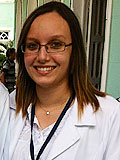 Dominique is a third-year medical student at the Federal University of Rio Grande do Norte in the city of Natal, north-eastern Brazil. In August she will be travelling to Rotterdam to attend a one-semester programme in research training in Health Sciences at NIHES-Erasmus MC. Dominique is one of several undergraduate students throughout Brazil to be awarded a Science without Borders scholarship.
Dominique is a third-year medical student at the Federal University of Rio Grande do Norte in the city of Natal, north-eastern Brazil. In August she will be travelling to Rotterdam to attend a one-semester programme in research training in Health Sciences at NIHES-Erasmus MC. Dominique is one of several undergraduate students throughout Brazil to be awarded a Science without Borders scholarship.
Dominique has always wanted to study abroad and feels privileged to have been accepted for the programme. The 20-year-old is attracted to the progressive and tolerant ideals of the Netherlands and chose Erasmus MC for its international profile and worldwide recognition. For her, Erasmus MC provides a perfect match of education and research.
A student with a wide range of interests, Dominique is keen to participate in research in fields such as ageing, neuroscience, oncology and chronic pain. She is appreciative of the investments in her education and hopes that her personal achievements will enable her to contribute professionally to her community.
About Science without Borders – SwB
 Science without Borders is a large-scale scholarship programme created and financed by the Brazilian government. It offers Brazilian top students the opportunity to study at a higher education institution in the Netherlands or to carry out research there. Grants are allocated at three levels: bachelors, PhD and post-doctoral.
Science without Borders is a large-scale scholarship programme created and financed by the Brazilian government. It offers Brazilian top students the opportunity to study at a higher education institution in the Netherlands or to carry out research there. Grants are allocated at three levels: bachelors, PhD and post-doctoral.
About the Netherlands Institute for Health Sciences – NIHES
The Netherlands Institute for Health Sciences (NIHES) is an alliance of leading Dutch universities and research institutes that collaborate on quantitative medical and health research. In our Master of Science programmes and short courses, we provide graduate and postgraduate research training in quantitative medicine and the health sciences. We have five core disciplines – Epidemiology, Clinical Epidemiology, Genetic Epidemiology, Public Health, and Medical Informatics – and four key partners: Erasmus University Rotterdam, the University of Amsterdam, the National Institute for Public Health and the Environment, and the Netherlands Cancer Institute.
 Fernanda Mezzomo Collares is a 25 year old student from Universidade Federal do Rio Grande do Sul.
Fernanda Mezzomo Collares is a 25 year old student from Universidade Federal do Rio Grande do Sul. Gilson Gabriel Viana Veloso, a 22 year old fifth-year Medicine student at the Pythagoras College in the city of Montes Claros, southeastern Brazil.
Gilson Gabriel Viana Veloso, a 22 year old fifth-year Medicine student at the Pythagoras College in the city of Montes Claros, southeastern Brazil. Laura Pletsch Borba is a 22-year-old medical student, from Porto Alegre, Brazil. She attends Pontifical Catholic University from Rio Grande do Sul, situated in her hometown.
Laura Pletsch Borba is a 22-year-old medical student, from Porto Alegre, Brazil. She attends Pontifical Catholic University from Rio Grande do Sul, situated in her hometown.